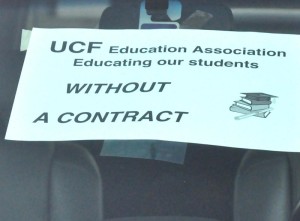Teachers rejected proposal that skews more closely to district offer on economic issues, union on work rules
Updated: Feb. 10, adds comments from teachers’ union.
By Mike McGann, Editor, UnionvilleTimes.com
 EAST MARLBOROUGH — From a quick read of fact-finder Mariann E. Schick’s proposed settlement between the Unionville-Chadds Ford School District and the Unionville-Chadds Ford Education Association, it’s clear that neither side would have gotten exactly what it wanted had it formed the basis of an agreement — now somewhat unlikely after the teachers’ union voted Monday to reject the proposal.
EAST MARLBOROUGH — From a quick read of fact-finder Mariann E. Schick’s proposed settlement between the Unionville-Chadds Ford School District and the Unionville-Chadds Ford Education Association, it’s clear that neither side would have gotten exactly what it wanted had it formed the basis of an agreement — now somewhat unlikely after the teachers’ union voted Monday to reject the proposal.
The Pennsylvania Labor Relations Board released the complete text of the proposal Wednesday afternoon and while there were wins and losses for both sides, Schick seemed to largely buy the district’s arguments when it came to salaries and health care benefits.
The Unionville-Chadds Ford district released a statement Wednesday afternoon, reaffirming its position and noting that Schick had largely sided with them in a process called for by the teachers’ union.
“In December, the UCFEA Negotiating Team and UniServ representative Ruthann Waldie, initiated the fact-finding option,” the statement said. “The Board has long sought a fair and reasonable compromise. The Fact-Finding report simply affirms the Board’s position since January 2010 and a desire to bring lasting labor peace to the students, parents, and teachers of the District.”
The Unionville-Chadds Ford Education Association issued a statement early Thursday, saying the members had “difficulty” in accepting some aspects of the proposal.
“The UCFEA membership wishes to maintain a Personal Choice plan, rather than move to an HMO,” statement said. “The Association’s proposal included a cost-saving plan, different than their current plan, and very similar to a Personal
Choice plan recently given to administrators. Members are willing to pay increased premiums to meet this goal. Additionally, the membership was uncomfortable with Fact Finder Schick’s recommendation for “half” steps, which could potentially set precedent for a salary system that would take members thirty two years to attain the maximum salary.”
While the board was willing go for a slightly higher bonus and third-year pay increase than it proposed, the union was unwilling to accept a half-step up the seniority ladder in years two and three of the proposed three-year pact. Approximately 70 of the district’s 330 teachers are currently at the top of the salary range — currently paid $101,427 annually — would see little in the way of a salary increase, nothing this year and about 1% in each of the next two school years.
Schick proposed:
Year 1: Each employee shall receive a $1000 off matrix bonus. Prep-Level Movement for qualifying members of the Unit.
Year 2: Employees shall move ½ step up the matrix and in addition, there shall be a 1% increase in each cell in the salary schedule. Prep-level movement for all bargaining unit members.
Year 3: Employees shall move up the remaining ½ step, and there shall be a 1% increase in each cell in the salary schedule. Additionally, since those at Step 16 have received no benefit over the last 2 years of the Agreement from Step movement, they shall each receive a $1000 off matrix bonus. Prep level movement for all eligible bargaining unit members.
The UCFEA was seeking a full-step increase in both years, as well as across-the-board increases, but in coming in closer to the district’s numbers, Schick cited “the current economic climate remains precarious with a substantial rate of unemployment…in times such as these, the public purse, and of the taxpayers who contribute to it, must be respected and wisely and cautiously spent.”
Schick did mostly side with the union on a number of non-economic issues, rejecting changes the board sought and retaining virtually all existing language for work rules, continuing education and advancement and supplemental contracts. Schick, a Philadelphia attorney, is one of the most experienced labor arbitrators in the tri-state region, and regularly hears labor arbitration cases in Pennsylvania, New Jersey and Delaware.
The complete report can be found here.






